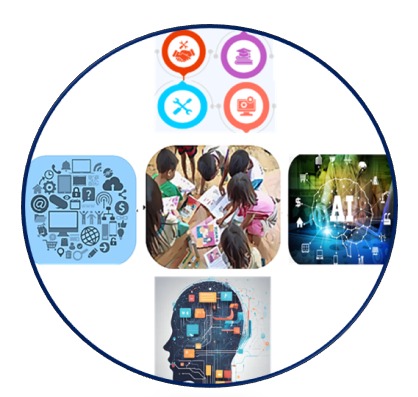Research Article | Open
Access
|
Open
Access
|


 | Published online: 27 September 2025
Artificial Intelligence and ICT Systems for Promoting
Inclusive, Equitable, and Quality Education
| Published online: 27 September 2025
Artificial Intelligence and ICT Systems for Promoting
Inclusive, Equitable, and Quality Education
Yusuf Sagir,1,* Adamu Tijjani Yahya2 and Abdullahi Usman Kofar Naisa3,*
1Department of Social Work, Kalinga University, Raipur, Chhattisgarh 492101, India
2Department of Social Development, Kano State Polytechnic, Kano, 700282, Nigeria
3Mumbayya House, Aminu Kano Centre for Democratic Studies, Bayero University, Kano, 700006, Nigeria
*Email: aukofarnaisa.mambayya@buk.edu.ng (A. K. Naisa)
J. Inf. Commun. Technol. Algorithms Syst. Appl., 2025, 1(2), 25311 https://doi.org/10.64189/ict.25311
Received: 03 August 2025; Revised: 22 September 2025; Accepted: 25 September 2025
Abstract
The global demand for inclusive, equitable, and quality education, as articulated in Sustainable Development Goal 4 (SDG 4), has intensified the search for innovative solutions that address barriers to learning. Artificial Intelligence (AI) and Information and Communication Technology (ICT) systems have emerged as transformative tools with the potential to reshape educational landscapes, enhance access, and promote equity. This Study examines the role of AI and ICT in advancing inclusive and quality education, focusing on their applications in personalized learning, accessibility for marginalized groups, and the reduction of systemic inequities. Through a review of existing literature, global case studies, and theoretical frameworks such as digital inclusion and constructivist learning, the study highlights both opportunities and challenges of integrating emerging technologies into education. Findings suggest that AI-driven adaptive learning platforms, ICT-enabled remote learning solutions, and assistive technologies can significantly improve educational outcomes. However, concerns about ethical use, digital divides, infrastructural gaps, and algorithmic bias must be addressed to ensure these tools fulfill their promise of equity and inclusivity. The study concludes with recommendations for policymakers, educators, and technology developers to create enabling environments that harness AI and ICT responsibly for sustainable educational development.
Graphical Abstract
Novelty statement
This study examines the role of AI and ICT in advancing inclusive and quality education, focusing on their applications.






